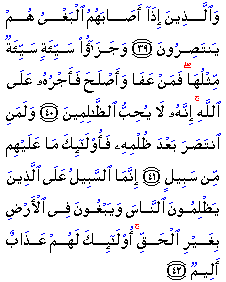Rule of Retaliation, Recompense, Working With Nature
Issue 266 » March 19, 2004 - Muharram 27, 1425
General
| Living the Quran |
Ash-Shura
(The Consultation)
The believers do not fall prey to the tyrants. Their tender heartedness and forgiving nature is not the result of any weakness. Their nobility demands that when they are victors they should forgive the errors of the vanquished; when they possess the power, they should avoid vengefulness and when a weak or subdued person happens to commit a mistake they should overlook it; but when a powerful person, drunk with authority, commits violence against them, they should resist and fight him with all their might. These verses introduce three basic principles of retaliation:
Source: |
| Understanding the Prophet's Life |
Your Recompense is with Allah The Prophet (peace be upon him) said: "Whoever has his eyesight taken away from him and is (then) patient, he will be compensated for it with Paradise." "Whoever loses a loved one from the people of this world and then seeks his recompense wit his Lord, will be compensated with Paradise." When Allah, the exalted, takes something away from you, He compensates you with something better, but only if you are patient and seek your reward from Him. So do not feel excessive sorrow over some misfortune, because the One Who decreed it has with Him Paradise: recompense and a great reward. Truly, the life of this world is short and its treasures are few. The Hereafter is better and everlasting. Whosoever works hard here shall find ease there. As for those who cling to this world, who are attached to it, and who are in love with it, the hardest thing for them to bear would be to lose this world's comforts and riches: they desire to enjoy this life alone. Because of this desire, the do not react to misfortune as well as others do. Source: |
| Cool Bits! |
Working With Nature Muslims have looked upon nature as an open book, a second revelation from God, which anybody who has cultivated the necessary knowledge and discipline could read. The Quran, they maintain, is easier to read. Its statement of the will of God is direct and eloquent. Nature, on the other hand, has to be "treated" to uncover her secret, her law, by scientific investigation and experimentation. But with some preparation, its truth is as public as that of the Quran. Nature is pliable and capable of change; and humans are capable of altering its forms to what ought to be. Agriculture, horticulture, engineering, and architecture - in short, civilization itself - have their basis precisely in such alteration. But no alteration performed out of vengeance or resentment against nature, or without responsibility to the Creator of nature, can remain innocent for long. For if nature is not used as a gift from God given for moral purpose, its abuse is certain. If the moral purpose of God is denied, may nature not be abused? In Islam, no such abuse of nature is possible. For the secret of working of nature is God's pattern and will, and the utility of nature is a divine gift meant solely for fulfillment of the moral law. Source: |
